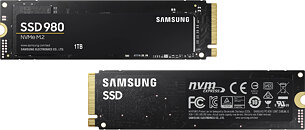Thursday, March 4th 2021

Samsung 980 is a Cost-Effective, DRAM-less PCIe Gen 3.0 M.2 SSD
In a move that could confuse some of the lesser informed buyers, Samsung is ready with the new 980 M.2 NVMe SSD (not to be confused with the 980 PRO). Unlike the 980 PRO, the 980 is a cost-effective drive that uses PCI-Express 3.0 x4 host interface, and a DRAM-less controller. Luckily, Samsung didn't take the QLC route with these drives, as they feature 136-layer 3D TLC NAND flash memory of the same kind used in the 980 PRO.
The Samsung 980 offers sequential transfer speeds of up to 3,500 MB/s reads, with up to 3,000 MB/s writes, and comes in capacities of 250 GB, 500 GB, and 1 TB. It offers 4K random access performance in the neighborhood of 500,000 IOPS reads (4K, QD32), with up to 480,000 IOPS random writes (4K, QD1). Samsung is expected to formally launch the 980 on March 30, 2021.
Source:
Tom's Hardware
The Samsung 980 offers sequential transfer speeds of up to 3,500 MB/s reads, with up to 3,000 MB/s writes, and comes in capacities of 250 GB, 500 GB, and 1 TB. It offers 4K random access performance in the neighborhood of 500,000 IOPS reads (4K, QD32), with up to 480,000 IOPS random writes (4K, QD1). Samsung is expected to formally launch the 980 on March 30, 2021.


34 Comments on Samsung 980 is a Cost-Effective, DRAM-less PCIe Gen 3.0 M.2 SSD
The only thing that needs to happen is less "accidentally turning the lights off for 5 minutes" in manufacturing plants and things like that. If they were honest about these things I believe we could be really close in ssd to hdd gb/$ parity.